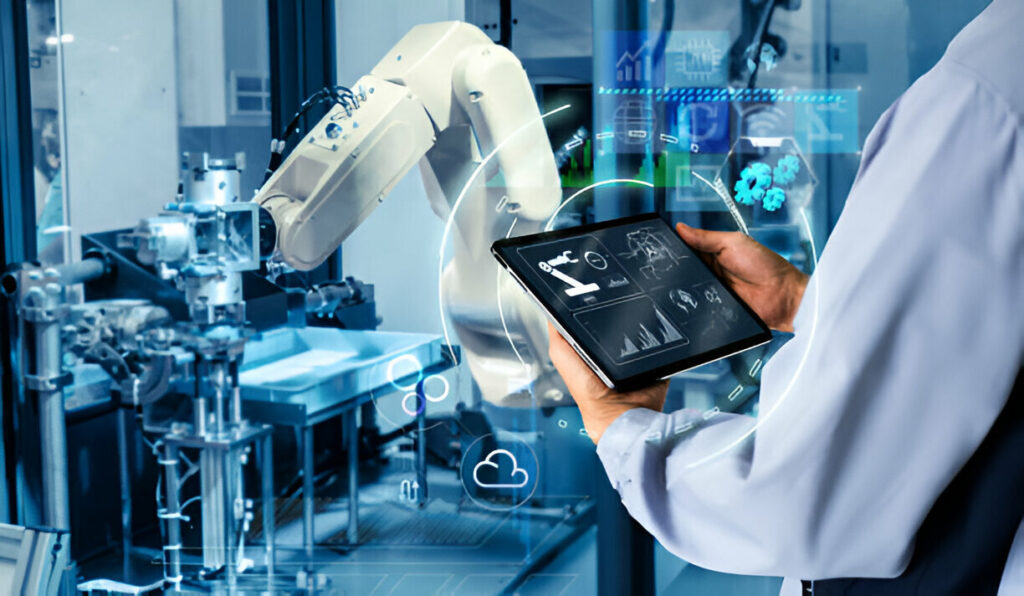In today’s fast-paced world, AI in Industry is changing how businesses operate. It boosts productivity, improves efficiency, and automates processes that were once time-consuming. From manufacturing to healthcare, artificial intelligence is helping industries perform better and faster. In this post, we will explore how AI in Industry is making a big difference and why it is important for businesses to embrace it.
The Role of AI in Industry: A Game Changer for Modern Businesses
AI has become a key player in almost every industry, from manufacturing to healthcare. It helps businesses improve productivity, reduce costs, and enhance quality. AI in Industry isn’t just about using technology—it’s about creating smarter workflows and systems. These systems allow businesses to make the most of their resources.
At its core, AI refers to the use of machine learning, automation, and data analysis to solve problems and streamline processes. AI can process huge amounts of data quickly, allowing businesses to make smarter decisions. This is crucial in today’s competitive market.
AI helps reduce human error, predict maintenance needs, and optimize supply chains. These benefits help businesses operate more efficiently and save time and money.
How AI in Industry Enhances Productivity Across Different Sectors
Let’s look at how AI in Industry is improving efficiency in various industries.
Manufacturing Industry
In manufacturing, AI is automating tasks that were once done by humans. For example, robots can now weld, paint, or inspect products with high precision. This reduces human labor costs and the chance for mistakes.
AI also uses predictive analytics to anticipate when machines might break down. This allows manufacturers to fix problems before they happen, reducing downtime and keeping production flowing smoothly.
Healthcare and AI in Telemedicine
AI in healthcare, particularly in telemedicine, is a big change. AI tools are helping doctors diagnose and treat patients more accurately. By analyzing medical data, AI can predict health issues and suggest treatments.
Telemedicine—which allows doctors to consult with patients remotely—is more effective thanks to AI. AI can power chatbots that answer patient questions, and virtual platforms can provide consultations. This makes healthcare more accessible.
AI also analyzes medical images, helping doctors spot health issues like cancer early. As a result, patients get the treatment they need on time, improving outcomes. By using AI, doctors can also handle more patients, which reduces the burden on healthcare systems.
Retail and AI-Driven Customer Experience
AI is changing the way retailers interact with their customers. AI-powered tools, like chatbots, answer customer questions instantly, improving service. AI also tracks customer preferences, helping businesses offer personalized shopping experiences.
AI helps retailers manage their inventory better, making sure the right products are available at the right time. This reduces stockouts and overstocking. It also helps retailers predict sales more accurately, improving supply chain efficiency.
Logistics and Supply Chain Optimization
AI is also improving logistics and supply chain management. It helps businesses optimize delivery routes, predict demand, and manage warehouses more efficiently. AI tools analyze data to predict delays and disruptions, allowing businesses to respond quickly.
Using AI in logistics reduces fuel costs and improves delivery times. AI helps create more efficient supply chains by improving every step, from purchasing to distribution. The result is smoother operations and reduced costs.
Why Businesses Should Adopt AI
Adopting AI in Industry brings several advantages. Here’s why businesses should embrace this technology.
Cost Reduction
AI helps businesses cut costs by automating tasks that were once done manually. This reduces the need for human labor in repetitive tasks and minimizes errors. The result is lower costs and more efficient operations.
Better Decision-Making
AI provides businesses with real-time data, helping them make better decisions. Whether it’s forecasting customer demand, analyzing market trends, or studying customer behavior, AI tools provide the insights businesses need to succeed.
Enhanced Customer Experience
AI also improves customer service. Chatbots, for example, are available 24/7 to handle customer inquiries. Personalized recommendations based on customer preferences improve sales and customer satisfaction.
Competitive Advantage
Companies that use AI gain an edge over competitors. AI helps businesses innovate faster and improve their products and services. As AI becomes more common in various industries, those that don’t adapt may find themselves falling behind.
Future-Proofing Your Business
AI is the future, and businesses that adopt it will be ready for long-term success. From AI-driven manufacturing to telemedicine, AI has endless applications. By embracing AI now, businesses can ensure they remain competitive as technology continues to evolve.
The Future of AI in Industry: What’s Next?
As AI advances, its applications will continue to grow. AI in Telemedicine and other sectors will become more widespread. For example, in healthcare, we may see more remote surgeries and real-time health monitoring thanks to AI.
In manufacturing, AI-driven automation will manage entire production lines. AI will help businesses in retail offer even more personalized customer experiences. In logistics, AI will continue to optimize supply chains, making them faster and more efficient.
The future of AI in Industry is bright, and businesses that embrace this technology will be in a strong position for success.
Conclusion
In conclusion, AI in Industry is transforming how businesses operate. It makes industries more efficient, cost-effective, and customer-friendly. From improving manufacturing processes to enhancing telemedicine, AI is driving innovation.
Looking ahead, AI will continue to shape the future of industries. Businesses that adopt AI will stay competitive and thrive in an increasingly tech-driven world.
For more information on how AI can transform your business, check out this resource on AI applications to learn more.
Also read : Automation in Manufacturing: Pros, Cons, and the Future




